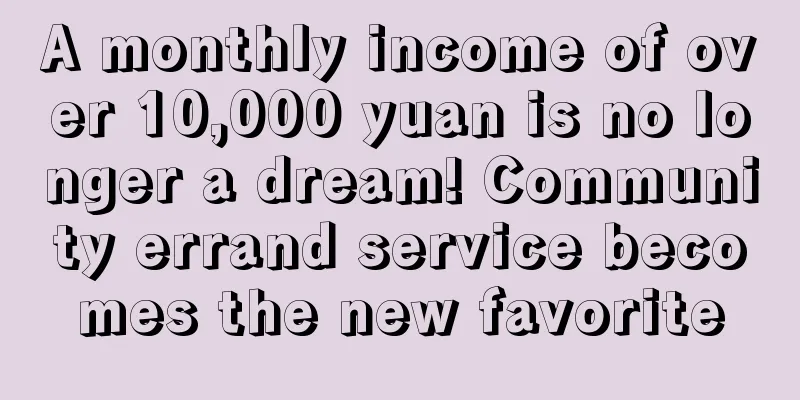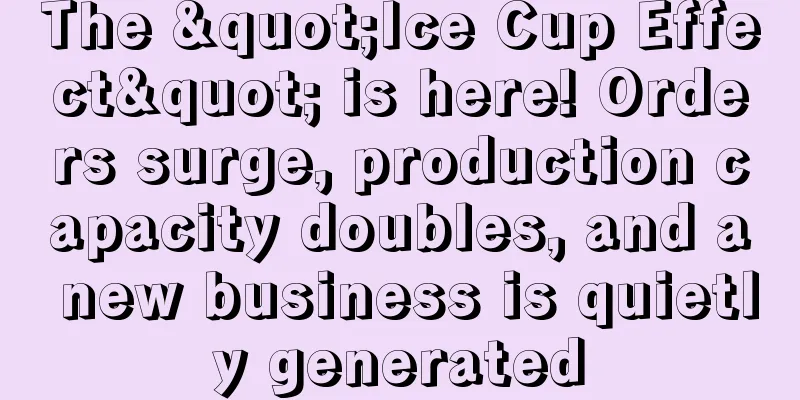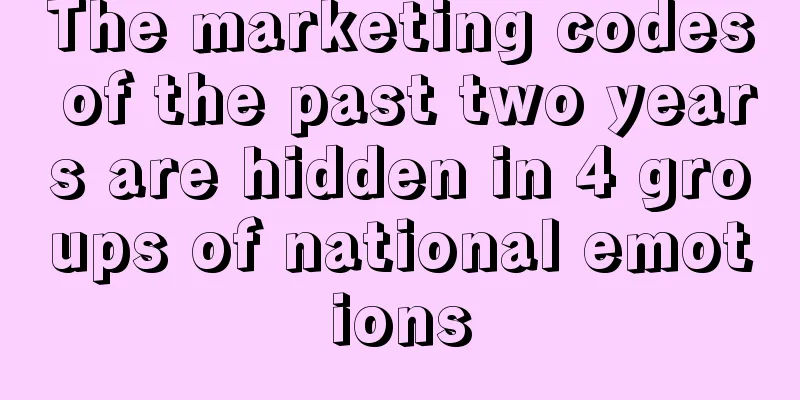An article to clarify career development paths: deciding whether to become a product expert or an operations expert

Friends often ask what is the difference between product manager and product operation, and which position they should choose. I have led teams with both product and operation roles, and I have worked on both product and operation. Many friends are also curious about how I can switch freely. In fact, as long as we clearly define the responsibilities of product and operation, and clearly distinguish the focus of thinking in these two positions, we will know what to do and how to choose. Let’s talk about this topic today. 1. Different thinking dimensionsExtract the core keywords of product managers from JD: demand analysis, market analysis, competitive product research, user research, interaction design, prototypes and documentation, etc., aim at user needs to plan new products or functions and realize their various functional points, follow up well, and prevent development work from becoming a sunk cost. To put it simply, a product manager is a person who bears fundamental responsibility for a product. His or her main job duties include: product planning, demand collection and analysis, product design, promoting R&D and launching online, and achieving product goals. Therefore, the main job of a product manager is to discover user needs, plan product solutions and promote implementation. In other words, a product manager builds the foundation from 0 to 1 and creates value. Specific work includes demand analysis, market research, prototype design, project management, etc. Generally speaking, product work involves more internal communication (such as R&D, design, etc.); Because when a product manager receives a demand, he needs to think about the nature of the demand, and needs to produce a product solution through logical sorting and structuring. This product solution must meet user needs and ensure user experience, but it must also comply with the company's strategic planning. Therefore, product managers need to stand from both the user's perspective and the company's perspective, and consider providing a product solution that meets both user needs and commercial considerations. The main work of product operations is to formulate an operation plan after the product is launched, to attract new users, and to promote activation and retention. In other words, product operations are more inclined to the stage of 1 to 100, to maximize the value of the product. Specific work includes marketing, content operations, user operations, event planning, etc. Generally speaking, operations work is directly facing external users and customers. Therefore, the focus of product operations is on improving indicators. Their work is to obtain user volume, user activity, improve user stickiness, and realize revenue realization, etc. Product operations must first understand all the functions of their own products and the core features of the products. Combined with the product stage, find the KPI of the corresponding indicator, and then gradually reversely analyze and disassemble based on the indicator, and think of practical solutions to achieve the goal. 2. Different concepts and positioningA product manager is a position in an enterprise that is specifically responsible for product management. The product manager is responsible for determining what products to develop, what technology and business model to choose, etc. based on user needs. Product operation is a market-oriented position, which mainly manages product content and users from three levels: content construction, user operation, and event planning. 3. Different job responsibilities and work contentA product manager is a position in an enterprise that is specifically responsible for product management. The product manager is responsible for determining what products to develop, what technology and business model to choose, etc. based on user needs. Therefore, product managers need to constantly grasp market trends, research and manage demand, then extract planning versions from the demand pool, design product solutions based on each version iteration, and then maintain communication and collaboration with the development team to ensure that the product can be launched on time and in quantity. Product operations are responsible for product operation planning, marketing planning, business cooperation, project media communication, data analysis, market monitoring, etc. at work. Therefore, they formulate corresponding operation plans according to product positioning, launch them to the market, and constantly observe data, hoping to achieve corresponding data indicator goals. On the other hand, they also need to feedback user usage to product managers to further optimize the product and reduce user churn. 4. Targeting different groups of peopleProduct managers are mostly internal, facing developers, designers, operations, bosses, etc. Product operations are mostly external, mostly external, facing users, customers, etc. 5. Different role classificationsProduct Manager: In the toC field, product managers can be divided into functional PM, strategy PM, backend PM, etc., and gradually deepen their involvement with operations; Product operation: In the toC field, product operation can be divided into new media operation, content operation, user operation (activity), etc., which are gradually deepened by dealing with products in turn; taking Xiaohongshu as an example, between content operation and strategic products, content operation will formulate high-quality content standards based on user needs and community tone, and strategic products will assist algorithms in finding the characteristics of high-quality content. Features (such as text features, author identity, high praise, completion rate, etc.) to recommend high-quality content. Let’s take another example of user operation and background products. For example, in Douyin e-commerce, operations need to configure many activities or grant rights to users. At this time, it is impossible to make a separate requirement for each operation. Therefore, the product needs to collect the needs of each operation, abstract and refine the core functions, and build a universal background system. 6. Different capability modelsGeneral abilities: Whether it is a product manager or a product operator, there are many common and very important abilities, such as: goal-oriented awareness, communication skills, data analysis skills, etc. Product capabilities: Relatively speaking, product managers are required to have higher overall planning, logical thinking, organizational coordination, and technical familiarity. Overall planning: As the person in charge, the product manager usually needs to consider the longer-term planning of the product and what goals they hope to achieve at each stage. In this regard, operations are more about cooperation; Logical thinking: For specific product requirements, there are usually a lot of details in the implementation, so product managers are required to have careful logic and systematic thinking; Organization and coordination: Product managers do not create value themselves, but rather drive different roles to work together to complete the product to create value. Therefore, they need very strong organization and coordination skills to convince each role and make them willing to cooperate with you to complete the needs; Technical familiarity: Products and R&D deal with the most, so it is best to understand a little bit of technology, at least to know the division of technical modules, what kind of implementation plan is reasonable, to avoid being fooled 7. Different operational capabilitiesRelatively speaking, product operations will do better in business understanding (user understanding), sensitive insight, content perception, and innovative thinking. Business understanding: Product operations are the frontline roles that directly contact users/customers. They need to know users very well, understand their demands and problems, and then convert them into requirements and submit them to product managers. This is especially important in some vertical operations. They need to fully understand the rules of the industry, which may require several years or even more than 10 years of experience. Sensitive Insight: Compared with products, operations are usually more sensitive and have a better insight into market changes. They know how to promote and advertise products because they can have more direct contact with users. Content awareness: Content awareness includes two concepts. On the one hand, operations need to have a good sense of content, knowing what kind of content is good and what users like. On the other hand, operations need to have strong writing skills, be able to write good copy that attracts users and improves conversions. Innovative thinking: From my observation, operations students usually have more jumping thoughts and can usually come up with more innovative ideas, unlike product managers who mainly rely on logical reasoning. This is crucial when planning an event. 8. Different career developmentProduct Manager: Judging from the market situation, product managers usually have higher thresholds and higher salaries. In addition, business managers are generally from product backgrounds, but in the current employment environment, the promotion channels are getting narrower and narrower. In addition, for low-level products, many skills and methodologies are very common, so it is easy to change jobs with high job mobility, but it is also easy to get stuck due to insufficient in-depth understanding of the business. Product Operations: Product operation is relatively easier to get started with and the demand is relatively large. If you move up, you can become an operations expert in a vertical field by deepening your vertical expertise. This requires a lot of experience and you can do it for a lifetime. In addition, since operations have a deeper understanding of the industry and have stronger writing skills, it will be easier for you to develop a side business such as e-commerce or new media. 9. The difference between product managers and product operations1. The work content is closely related Product operations is one of the responsibilities of a product manager. 1) Product managers in small companies are responsible for both making and selling products, while in large companies the responsibilities are more detailed; 2) Product operations are not common in small companies. In large companies, product operations and product managers are responsible for the same product, but from different perspectives. 2. Mutual upstream and downstream products Managers develop/optimize products based on user/business needs collected by product operations, and product operations formulate product operation plans based on the products made by product managers. 3. Refined strategy Both product managers and product operations need to develop refined strategies at different stages of the product. 4. The work content is partially the same Whether it is a product manager or a product operator, most of them need to do competitive product analysis, market analysis, user analysis and other demand analysis to understand users and explore user pain points; they all need to design product solutions based on demand. 10. Common Misunderstandings①Operation is miscellaneous work: Operations work is indeed more complicated, but excellent operations staff will use systematic and process-based thinking to break things down clearly before handing them over to others. In fact, if you think about it carefully, everyone does odd jobs. Operations staff do odd jobs for product staff, product staff do odd jobs for R&D staff... ②Operation does not need to deal with technology: In my team, operations also need to raise requirements, such as a simple requirement, making an activity page, etc. One more link will increase the information gap, which is unnecessary. Every student needs to master basic skills; ③The product does not need to write its own copy: In my team, I also ask product managers to solve simple copywriting problems on their own, for the same reasons as above; ④The product does not need to contact the user: Most PMs are not typical users of the products they are responsible for, and actually do not understand user needs. Therefore, they must communicate more with operations and find more opportunities to contact users in order to better understand the business and optimize products. ⑤Product status is higher than operation: Not necessarily. It depends on the business attributes. Usually, the closer the product line is to the user, the more important the operation is. For example, in the field of e-commerce, the status of operation is very high, because there are many detailed business logics that only operations can deeply understand. At this time, the product is usually mainly coordinated. ⑥ Operation is not as good as product, transfer if possible: You still have to see if you are suitable and like the job first. You can refer to the job content and ability requirements above. Remember not to compete with others in areas you are not good at. For a product to be successful, occupy a certain market position, and have sustainable and good development, the product manager and product operation roles must work together to create "good products + good operations". Therefore, from this perspective, both positions are very important to the company. In short, a good product manager must understand operations, and good product operations must have product thinking in order to have longer-term development. |
<<: Xianyu "gives up" on Taobao
>>: The market lost by Dianping was picked up by Xianyu?
Recommend
Douyin has removed its paid knowledge products from its shelves. Is it starting to rectify the chaos of "cutting leeks"?
"Douyin announced that it would remove its ed...
Teach you how to calculate Xiaohongshu's break-even point in 30 seconds!
How do you know your ROI and whether it is worthwh...
What are the three types of Amazon keywords? Where should I write the keywords?
Amazon keywords are words related to products that...
How about Amazon adult products? Is it easy to do?
On Amazon, people usually open a store. In additio...
How to improve the store ranking of Wish? How to improve the ranking of Wish
Wish is an emerging mobile e-commerce company. The...
The founder’s dilemma: personal IP takes a back seat, company brand takes a front seat
Compared with the company/brand IP, users often re...
Is the Amazon bank statement a personal bank statement? How can I provide it?
If Amazon wants to verify the seller's bank ac...
Can Facebook sell products? Can it sell virtual products?
Facebook, also known as "Facebook", has ...
Chapter 2: Where are the boundaries of data governance?
In the wave of digital transformation, data govern...
Which is better, Shopify or Etsy? Comparison between Shopify and Etsy
Competition in the domestic e-commerce industry is...
What is the difference between Amazon on-site promotion and off-site promotion?
E-commerce cannot be separated from promotion, and...
When promoting e-commerce on Douyin, it is essential to have a shelf market
In Douyin e-commerce, the importance of shelf fiel...
From Xiaohongshu to Dianping, your cover is too fake
This article reveals the "cover party" p...
How terrifying is the hot spot on Bilibili? The nurturing UP master gained 8.8 million views and 400,000 fans in 20 days!
Starting from the World Cup, this article objectiv...
30 Models You Must Master for Private Domain Operations in 2024 (Version 3.0)
Starting from private domain operation, this artic...









